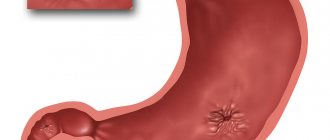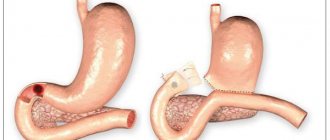- home
- Coloproctology
- Sigmoid colon cancer
Sigmoid colon cancer
Sigmoid colon cancer is an oncological disease of part of the colon, in which a malignant tumor is formed from the epithelium of the mucous membrane. The sigmoid colon, located above the rectum, according to statistics, is one of the organs most often affected by cancer. Most of the oncologist's patients are people aged 45-65 years, with more cases among men.
Depending on the direction of growth, an exophytic form of cancer is distinguished - a formation on a thick stalk grows into the intestinal lumen, and endophytic cancer, when the process spreads along the intestinal wall. In this case, ulcerations appear, the lumen of the intestinal tube narrows, the movement of intestinal contents is difficult.
Tumors of this location also differ in histological structure. Adenocarcinoma is more common - its poorly differentiated variety has an unfavorable prognosis and is characterized by early metastasis. Signet ring cell carcinoma, which is less common, also has a poor prognosis.
Among the negative factors that can lead to illness:
- diverticula, benign polyps susceptible to malignancy;
- diseases of the colon: colitis, Crohn's disease, atony, etc.
- digestive disorders: constipation, problems with peristalsis;
- alcohol abuse, smoking, unbalanced diet;
- some diseases: obesity, diabetes, etc.;
- hereditary predisposition.
General information
The name intestinal cancer summarizes all types of malignant tumors that affect the human intestine along its entire length. colorectal cancer most often develops , that is, malignant nutrition of the large intestine.
The small intestine is affected much less frequently. According to medical statistics, colorectal cancer is diagnosed in 89% of cases, malignant tumors of the small intestine - in 11% of cases. The ICD-10 code is C20 (Malignant neoplasm of the rectum). Most often, the disease is diagnosed in older people. According to statistics, about 36% of cases of this type of cancer occur in people over the age of 60. Colorectal cancer affects the lining of the colon or rectum. This is a dangerous disease, so people who have been diagnosed with this require immediate treatment.
Colon cancer (ICD-10 code - C18) can develop in different parts of the colon. It consists of the transverse colon, ascending colon, descending colon and sigmoid colon.
Duodenal cancer often develops as a process of metastasis of other types of malignant processes. Primary oncological lesion of the duodenum rarely develops.
When talking about the causes and pathogenesis of the disease, experts combine all types of malignant intestinal lesions. These diseases have similar symptoms and complications. But if the disease is diagnosed at an early stage, treatment is effective. This is why it is extremely important to pay attention to any warning signs and undergo all examinations in a timely manner.
How to recognize the disease, how quickly the pathological process develops and metastases , you can learn from this article. We will also talk about effective treatment regimens for the disease and the prognosis at one or another stage of intestinal cancer.
Kinds
Macroscopically, two forms of malignant neoplasm of the colon are distinguished - exophytic and endophytic. The first form of cancer is characterized by tumor growth into the intestinal lumen. It can take the form of a node or polyp, most often found in the right half of the colon, and is shaped like a cauliflower. An endophytic tumor in most cases forms in the left half of the colon. It infiltrates the intestinal wall, gradually covers its entire circumference and causes circular narrowing. Ulcers often form on the tumor.
Morphologists distinguish the following histological types of malignant neoplasms of the colon:
- Adenocarcinoma;
- Mucosal cancer;
- Solid cancer.
Colon cancer metastasizes late. This allows oncological surgeons to perform radical surgical interventions even with large tumors. The tumor is involved early in the inflammatory process. It often transfers to the fiber that surrounds the intestines. Metastases can remain in regional lymph nodes for a long time. They are removed during surgery along with the mesentery.
Make an appointment
Pathogenesis
The colon has the highest bacterial density and diversity throughout the gastrointestinal tract. This indicates that the mural microbiome plays an important role in the pathogenesis of the disease. At this stage, the pathogenesis of colorectal cancer is still being actively studied. However, research suggests that some types of bacteria contribute to tumorigenesis.
It has been noted that the increase in cases of this type of cancer in developed countries is associated with a high meat content in the diet and, accordingly, a decrease in the amount of fiber consumed. As a result of such nutrition, the growth of intestinal bacteria is activated, which, in turn, produce carcinogens.
There are also a number of other risk factors: chronic inflammatory diseases of the colon, bad habits, heredity, etc.
Statistics
According to statistics, the disease is the third most frequently diagnosed cancer in the world, and there is a constant increase in cases of its detection. It accounts for about 8% of all new cancer cases in the United States. In 2012, approximately 447,000 patients in Europe were diagnosed with this disease. This is approximately 13% of all cancer cases in the region.
Colorectal cancer is more common in men than in women . In Europe, one in 20 men and one in 35 women will develop colorectal cancer at some stage in their lives. In other words, every year in Europe, approximately 35 men out of 100,000 men and approximately 25 women out of 100,000 women are diagnosed with colorectal cancer. The peak incidence is observed between 65 and 74 years . The incidence of colorectal cancer is higher in industrialized and urbanized areas.
Epidemiology of colorectal cancer (morbidity and mortality)
Classification
The concept of “bowel cancer” combines a number of malignant diseases that affect different parts of the intestine. However, the colorectal form of the tumor is most common.
There are several different classifications of stages of this form. The simplest classification is considered to be:
- The first stage - the tumor spreads exclusively to the inner layers of the intestine. At this stage, about 90% of cases of the disease are cured.
- The second stage - the tumor actively increases and spreads through the intestinal wall to neighboring organs and structures.
- The third stage - the pathological process spreads to local lymph nodes (metastasis is observed).
- Stage four – the tumor spreads to the liver, lymph nodes, and lungs located remotely from the tumor.
Taking into account the clinical course of the disease, the following forms of oncological process of the colon are determined:
- Toxic-anemic – general symptoms ( anemia , fever ) dominate.
- Dyspeptic - discomfort in the gastrointestinal tract predominates, similar to the symptoms of gastritis or cholecystitis .
- Enterocolitic – intestinal disorders predominate.
- Obstructive – intestinal obstruction is noted, which progresses.
- Pseudo-inflammatory - manifestations of inflammation of the abdominal cavity are observed, in which pain, fever, and leukocytosis .
- Atypical - the presence of a tumor is determined by palpation, while adverse symptoms practically do not appear.
Causes of bowel cancer
The main reasons for the development of tumors in the intestines are as follows:
- Heredity - the tumor is more often diagnosed in people whose close relatives had this type of cancer, or they were diagnosed with intestinal polyps.
- Excessive consumption of red meat - those who eat pork, lamb, and beef too often are at risk.
- Poor diet in general - the likelihood of illness is increased in those who consume few vegetables, fruits, grains and at the same time eat a lot of animal fats.
- Insufficient physical activity.
- Smoking, alcohol abuse.
- Inflammatory bowel disease - the likelihood of the disease increases with Crohn's disease and chronic ulcerative colitis .
- Unfavorable environmental conditions.
Symptoms of bowel cancer
If a person develops bowel cancer, there may be few or no symptoms in the early stages. The first signs of intestinal cancer at an early stage do not always manifest themselves as malaise, loss of strength or other unpleasant symptoms. Therefore, recognition of the disease at an early stage is most often achieved during screening or in the process of research for other diseases. As the disease develops, it gradually causes unpleasant symptoms. However, the first stage of colorectal cancer often occurs unnoticed by the patient.
The first symptoms in women and men may be as follows:
- Painful sensations - colorectal cancer can manifest itself as pain in the abdomen. In the early stages, pain varies in intensity and nature.
- Noticeable changes in the functioning of the intestines - such signs of the disease are associated with intestinal disorder, since the development of the tumor leads to disruption of motility and passage of intestinal contents.
- Increased urination.
- The appearance of blood in the stool. In this case, it is important to exclude other causes of this symptom, such as anal fissures or hemorrhoids . The color of the stool sometimes turns black. The shape of the stool also changes.
- Discomfortable sensations, bloating, a feeling of heaviness, a full stomach after eating. As a result, men and women's appetite decreases and people begin to lose weight. Belching , vomiting, and nausea may also occur
- Flatulence , rumbling in the stomach, constipation .
If such symptoms persist for a long time, you should consult a doctor.
As colon cancer develops, it often leads to the appearance of mucus, pus, and blood in the feces. Heavy bleeding is rare, but prolonged bleeding can still lead to anemia in children and adults.
The first symptoms of duodenal cancer often include pain in the right hypochondrium, belching, and heartburn , which, when the duodenum is affected, is associated with increased acidity. Jaundice is noted. In addition, general signs of duodenal cancer appear - fatigue, loss of appetite, weakness, tachycardia , dizziness , fatigue . A person who develops a pathological process may suddenly lose weight.
Symptoms of cancer of the cecum appear similarly, in which dropsy in the abdominal cavity and enlargement of the liver can also be observed. With a tumor of the cecum, other symptoms also appear.
Colon cancer also causes similar symptoms. As the process progresses, cramping pain may develop, which is characteristic of intestinal obstruction .
The manifestation of a tumor of the small intestine may also be invisible in the initial stages. At later stages intoxication and weight loss occurs. Intestinal bleeding and obstruction are possible. If the tumor progresses, neighboring organs may be compressed. Ascites, jaundice, and pancreatitis .
Signs of intestinal cancer in women and men are in some cases associated with the development of intestinal obstruction or intussusception. In this case, colon cancer causes severe pain that does not go away. In this case, stool and gases do not pass, and rapidly increasing manifestations of general malaise are noted. In such a situation, immediate medical attention is required, otherwise the condition will be fatal.
In women, intestinal cancer can lead to dysfunction of the genital organs. In such a situation, the gynecologist prescribes additional examinations to determine the tumor of the colon.
Treatment
Oncologists at the Yusupov Hospital remove a malignant tumor of the colon using surgery. Resection of the affected area of the colon along with the mesentery is performed, and lymph nodes are also removed. If cancer of the ascending colon is detected, treatment is carried out by right hemicolectomy. The tumor of the cecum is removed using the same method. The surgeon removes the lymphatic system, the entire right half of the colon, including one-third of the transverse colon, ascending colon, cecum, and portion of the hepatic flexure.
Preparing for surgery
Regardless of the nature and scope of the operation, doctors at the Oncology Clinic carry out general and special preoperative preparation, which largely ensures the success of the surgical intervention. With the help of modern infusion agents, water-electrolyte imbalances are eliminated, protein levels are normalized, and hypochromic anemia and intoxication are combated. Patients are given intravenous infusion of drugs and blood components, glucose with vitamins, and electrolyte solutions. At the same time, measures are taken to improve the function of vital organs (heart, lungs, adrenal glands, liver, kidneys).
Special preparation is aimed at removing feces mechanically. Patients are given laxatives, given enemas, and pathogenic microflora, which is abundantly present in the intestinal contents, is suppressed with medications.
For preoperative preparation of the large intestine, an elemental diet is used. 3-5 days before surgery, doctors prescribe special medications to patients that contain all vital food ingredients in refined form.
Make an appointment
Palliative resections
In the absence of the technical ability to perform radical surgery, surgeons perform palliative resections of the colon. The choice of palliative intervention depends on the following factors:
- Localization of the neoplasm;
- Degree of tumor spread;
- Anatomical features of the location of the primary lesion;
- Complications of the tumor process;
- General condition of the patient.
If it is impossible to remove the tumor of the right half of the colon, surgeons perform a bypass ileotransverse anastomosis. For inoperable neoplasms of the descending colon and splenic angle, a bypass transversosigmoanastomosis is created. If a tumor of the final part of the colon is detected, a proximal colostomy, single-barrel or double-barrel unnatural anus, is applied.
Chemotherapy
Chemotherapy in the treatment of colon cancer is used for different purposes - to shrink the tumor before surgery, stop its growth, destroy cancer cells, and metastases. Colorectal cancer is a tumor that is quite resistant to cytostatics. Chemotherapy for colon cancer is prescribed by a doctor depending on the size of the tumor and the presence of metastases, and is carried out in courses.
If regional lymph nodes are affected or the tumor has invaded the serous membrane of the intestine, adjuvant chemotherapy is performed. If there is a potential risk of developing metastases to other organs, the most active chemotherapy is performed. After several cycles of treatment with antitumor drugs, the state of metastases is assessed and the lesions are removed. After surgery, adjuvant chemotherapy is used.
Tests and diagnosis of colon cancer
Speaking about how to check the intestines for oncology, it should be noted that the optimal diagnostic method should be chosen by the doctor. As a rule, early diagnosis is carried out during a preventive examination or during studies related to other diseases.
To check the small intestine for the presence of a tumor, most often, if the development of intestinal cancer is suspected, a colonoscopy with biopsy . It is colonoscopy that makes it possible to conduct a detailed examination of the large intestine (rectum, colon, sigmoid, cecum).
To check the condition of the intestines without a colonoscopy, MRI is used. The most informative method, which makes it possible to obtain answers to a number of important questions, is PET-CT. In particular, this study makes it possible to determine what stage of the patient’s disease, whether he has metastases , whether surgery is advisable, etc.
To establish a diagnosis, a pathomorphological examination of the tissue is required. It makes it possible to distinguish between benign and malignant tumors. At the same time, it is important to conduct such a study qualitatively, since errors can be fatal for the patient.
An analysis is also carried out for the presence of occult blood. A special test is used for this.
An important stage of the examination is laboratory tests, in particular a blood test, during which tumor markers and other blood test indicators are determined. Speaking about which tumor marker indicates the presence of a malignant process in the body, it should be noted that only a specialist can correctly decipher the data obtained.
Other indicators (ESR, etc.) are not decisive during diagnosis, since the ESR level is not elevated in all such patients.
If necessary, other examinations are also practiced: rectosigmoidoscopy , irrigoscopy , etc. During the examination, laboratory tests, etc. are also carried out.
Prevention of bowel cancer
Proper prevention makes it possible to reduce the likelihood of developing oncological processes in the intestines. However, all preventive measures should be practiced constantly. It is most important to follow these guidelines:
- Quit all bad habits. You should minimize your alcohol consumption and stop smoking.
- Introduce as much fiber into your diet as possible. Dietary fiber promotes intestinal motility and prevents stagnation. It is important to eat fresh vegetables and fruits every day.
- Eat right, minimizing the amount of junk food. It is important to limit the amount of fried foods and fast food.
- Practice physical exercise every day. Physical activity is important to improve peristalsis.
- When the first unpleasant signs appear, you should consult a doctor.
- Regularly undergo preventive examinations. This advice is especially relevant for those diagnosed with Crohn's disease , nonspecific colitis , and intestinal polyposis .
Diet
Diet (nutrition) for intestinal cancer
- Efficacy: no data
- Timing: constantly
- Cost of products: 1800-3800 rubles. in Week
Proper organization of nutrition for intestinal cancer is very important, as this is one of the points of the overall treatment plan. The patient needs both a special diet to maintain immunity and proper nutrition after intestinal surgery.
When organizing meals, it is important to adhere to the following tips:
- Foods with preservatives, dyes and chemical components should be excluded.
- Fats should be kept to a minimum, and sugar and sweets should be completely avoided.
- The menu should contain only fresh and high-quality products.
For intestinal oncology and after surgery, the diet should include the following foods and dishes:
- Rice.
- Greenery
- Eggs.
- Dried fruits.
- Liver.
- Seafood.
- Whole grain porridge.
- Soups and broths are low-fat.
- Steamed pumpkin dishes.
At the same time, you must avoid the following foods:
- Hydrogenated oil.
- Sausages and other processed meat products.
- Baked goods and dishes made from white flour.
- Sugar and artificial sweeteners.
- Alcohol.
Therapeutic measures after surgery
After the operation, the patient is transferred to the intensive care unit, where doctors monitor vital functions (blood pressure, oxygen saturation, kidney function), and also provide the necessary therapy. If the postoperative period is favorable, the patient is transferred to a hospital ward, where he receives further treatment. The doctor selects the diet for the patient in the postoperative period individually, depending on the volume and nature of the intervention. The main task after surgery is early rehabilitation of the patient. Subsequent treatment tactics after discharge are determined based on the results of histological examination at the oncology consultation
Prognosis for bowel cancer
Speaking about how long people live with such a diagnosis, and what is the prognosis for cancer of the ascending colon and other types of intestinal cancer, it should be noted that everything depends on the stage at which treatment was started and whether it is carried out correctly.
If the disease is detected at an early stage, then 5-year survival is observed in 90% of cases. If no recurrence of the tumor is detected within five years after the operation, the person is considered to have recovered.
But because the disease is detected in the early stages only in about a third of cases, the remaining tumors are at a stage that cannot be successfully treated. Therefore, even if surgery is performed for oncology of the colon, etc., the prognosis is often unfavorable. The same applies to tumors with metastases to the liver.
If a patient is diagnosed with cecal cancer, stage 4, we are already talking about the spread of metastases. There is an unfavorable prognosis for stage 4 intestinal cancer with metastases: at this stage the disease cannot be treated. The attending physician will help determine how to help a patient at stage 4 and how long he has left to live. In such a situation, palliative treatment is practiced to alleviate the patient's condition.
List of sources
- Vorobyov G.I., Odaryuk T.S., Shelygin Yu.A. Diagnosis and treatment of colon cancer // Russian Medical Journal. 1998. T 6, No. 19. P. 1244-1256.
- Karasev I.A., Malikhova O.A., Davydkina T.S. The role of intestinal microbiota in the pathogenesis of colorectal cancer. Review of literature data. Malignant tumors. 2020;10(3s1):60-62.
- Colon cancer: diagnosis and treatment: method. allowance / A. A. Zakharenko, V. A. Rybalchenko, M. A. Belyaev [and others]. – St. Petersburg: RIC PSPbSMU, 2022. – 24 p.
- Chissov V.I., Daryalova S.L. Clinical recommendations. Oncology. M.: GEOTAR-Media, 2006. 352 p.
Metastases
Colon cancer most often metastasizes to regional lymph nodes not immediately, but after a long time after tumor development.
The tumor often grows into neighboring tissues and organs. Colon cancer is generalized, with penetrating metastases to the lungs, liver requires consultation with a thoracic surgeon, hepatologist surgeon. Unresectable colon cancer is characterized by tumor growth into bone structures and great vessels. The possibility of tumor removal is being assessed; if surgery is not possible, palliative treatment (chemotherapy) is used.
Initially resectable metastatic lesions are removed surgically, followed by palliative chemotherapy. Also, as a treatment, systemic chemotherapy is carried out before surgery to remove metastases, and after surgery, chemotherapy treatment is continued.







